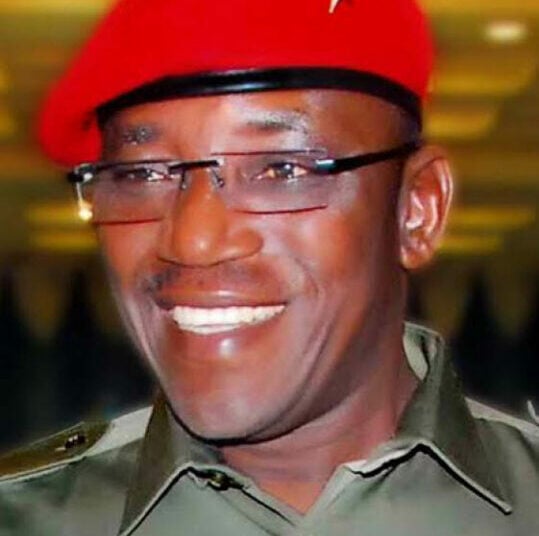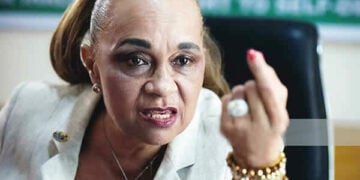What is your assessment of the APC administration led by President Bola Tinubu in the last two years and some months in the saddle?
Well, President Bola Tinubu and his family have achieved their life-long dream of seeing him become Nigeria’s president. To be fair to him, he has never pretended, his definition of government revolves around himself, his family and his close associates. Those are the areas where his investments and interests lie.
After over two years in office, there is nothing concrete to suggest that Nigerians have benefited meaningfully from his leadership.
I don’t entirely blame the president though, because his campaign mantra, “Emilokan” meaning “it’s my turn” was rooted in self-entitlement. It was never a promise to serve; it was an assertion of power. And if it is his turn, then he believes it is also his turn to control the nation’s resources and distribute them whimsically.
The president is not governing according to the Constitution of the Federal Republic of Nigeria but according to his own whims and caprices, and imaginations. That is why, today, Nigerians can see that the Montesquieu principle of Separation of Powers remains merely theoretical across all levels, the National Assembly, the State Houses of Assembly and local councils. Independence has been compromised. The Houses of Assembly have been pocketed by governors; councillors are at the mercy of local government chairmen; and the National Assembly has become an orchestra for the president. Each time they see him, they sing, they dance, and they clap, that seems to be their greatest achievement.
So, in this situation, where do you place the young people? They have been neglected for over three decades. The military began this deliberate neglect because they saw the youth as a threat, always protesting and demanding better living conditions. So, they sidelined them and created their own version of “youths,” giving them small handouts to sing praises.
When the political class took over in 1999, they inherited and perfected this system. Today, many Nigerians between the ages of 40 and 50 cannot even afford to buy wheelbarrows for themselves.
Most of them have become burdens to their aging parents, who once believed that after their children’s graduation, life would get better. Sadly, many of those parents are now battling terminal ailments, unable to feed themselves, while their children roam around jobless.
How would you describe the criticisms, outrage and suspicion trailing the recent presidential pardon for 175 ex- convicts?
President Bola Tinubu’s recent wave of presidential pardons has provoked outrage across the country. By freeing convicted drug traffickers, fraudsters, illegal miners, kidnappers, and even the notorious husband-killer, Maryam Sanda, the president has turned the constitutional power of mercy into a political bazaar.
What should be an act of compassion has instead become a tool of political favoritism that undermines the moral foundation of justice. The result is a judiciary stripped of dignity and a nation sinking deeper into moral decay. Judges who labored under intense pressure to deliver justice now watch helplessly as their verdicts are nullified by executive fiat. Years of painstaking prosecution and judicial courage have been rubbished in the name of mercy.
The judiciary once seen as the last hope of the common man, has become the biggest casualty of this political recklessness. If the Executive can whimsically overturn judicial decisions, then the courts are no longer temples of justice but chambers of irrelevance.
That the inclusion of hardened criminals in the pardon list is a slap on the face of morality and the victims of crime. It also goes to show the world that in Nigeria, crime pays provided one has political or social connections. The decision spits on the graves of victims and shatters the faith of families who once believed the state stood for justice.
It was alleged that the National Security Adviser (NSA) Mallam Nuhu Ribadu recently said security has improved by about 90%. Do you agree with this claim ?
No, I don’t agree with him. Security has not improved. What has improved is the budget. The national security budget is now N3.10 trillion. So, when the National Security Adviser says security has improved, he’s speaking from the perspective of increased funding, not actual safety of the people. If Nigerians were truly secured, how do you explain a journalist jumping out of a window in Katampe, Abuja, a so-called diplomatic zone just to escape from armed robbers? What kind of “improvement” is that?
Yes, I agree with him that the budget has increased. There’s more money for those within the security cycle to play with. But to say Nigerians are more secured than ever before is false. Abuja isn’t even safe anymore. When you hear people saying security has improved, what they really mean is that their pockets are fatter than before.
What about the situation in Kwara State. What’s your take on the growing insecurity in the state?
Yes, what happened in Kwara is very dangerous for national security. Kwara lies at the crossroads of the rainforest and the Sahel, it’s a mixture of northern and southwestern cultures. The politics there reflects the contradictions of ethnicity and religion, Yoruba and Fulani interests, Muslims, Christians, and Traditionalists all coexisting uneasily. These contradictions have now created serious security concerns. If the federal government continues to play the ostrich, as it has done elsewhere, and merely pays lip service while the Chief of Defence Staff prefers talking on television instead of commanding in the field, things could spiral out of control. It would be a grave threat to national security.
Tarok land, especially Langtang North and South LGA is considered safer compared to other places in the state presently, what do you think you people have done that others should emulate?
We were the first victims of banditry in Nigeria. Between 2002 and 2005 we were under invasion by bandits. There was no farming for about three years, no economic activities. You couldn’t even go outside your settlement more than two or three kilometres. That was what we went through. On a daily basis we had armed people invading our communities. But there was something we developed which suddenly became our survival mechanism. At first we were running; our people were displaced. But we later realised the invading forces had arms, yes, but they didn’t have a population greater than ours. And if we were always going to run, how long would we keep running? At a point in time we developed a community strategy: Okay, we will all have to stand and face them. Immediately that consciousness was developed and circulated among Tarok communities: whenever, they are coming, everybody should go and be ready to die so that history will have it that the whole community sacrificed their lives. In one of those attacks on my village, Sabon Gida, around 2002, I was in the bathroom and I had an alarm that the bandits were coming. My late mother, who was then around seventy-something years, before I could come out from the bathroom was already with a stick running like an Olympiad toward the direction where the bandits were coming. She was ready to die. The whole community, the children, young and old all came out in their large number. That show of courage kept the bandits back; they started retreating and started running. We kept pursuing them and at the end of the day we rounded them up. We also realised the power of the people is greater than arms.
Now, for safety in Tarok lands and other places, I think what the government needs to do is to harness the experience of retired servicemen. I’m even one of the retired servicemen. We have so many retired security personnel, retired this, retired that, from the security services. We need them to come together and bring their experiences to bare . Coming from different communities, they will understand the peculiarity of each community and help us develop a security approach to deal with these challenges. If you invite a retired security personnel — a retired police officer or ex-serviceman from any of these areas like Mangu, Bokkos they will be able to give you insight into the operations of these criminals. They will also give you insight into their firepower, their strength, what they would have monitored. They can provide motive from the pattern of the attacks. From that you can come up with and enhance operations. If we are going to enhance Operation Rainbow, it should be enhanced so that recruitment comes from different communities: recruit young people locally and give them security consciousness. They should be able to create awareness in any community.
Recently, Nigeria celebrated her 65 years of Independence, are we on the right track?
Well, let me begin by congratulating our founding fathers for their struggle for independence. Their intentions were noble, and they meant well for us as a people. Now, 65 years after their struggle, I take a cue from what the former governor of Anambra State and Minister of Labour Dr. Chris Ngigi who once said during the night of tributes to the late Chief Audu Ogbeh. He said Audu should, when he gets to heaven, report us to Tafawa Balewa, Ahmadu Bello, Awolowo, Azikiwe and Okpara that we have failed woefully, that we have not only fallen short of their dreams but have even retrogressed. We are worse off than where they left us.
Of course, we have attained independence as a nation and made some modest progress, but it is incomparable to the enormous resources we have been blessed with. I am 61 years old, so Nigeria is only about four years older than I am. I’m happy that we are still here as a nation, but deeply disappointed at the state we find ourselves today. Personally, I feel ashamed that my own life’s progress far outweighs that of my country.
Before the celebration of Nigeria at 65, Plateau State organized prayers in mosques and churches. Most people from the opposition parties did not attend the prayers which were meant to be for unity and progress of the state. Why did you not attend?
I was invited, but I had already made other commitments, which was why I couldn’t attend. However, I have always honored invitations from the state government, because it is my government, the government of Plateau State. Although I am in the opposition, I believe in collaborating and supporting any genuine effort that can move the state forward and promote peace. The governor made campaign promises to the people of Plateau, and I’m holding on to his checklist. When elections approach, I will review it to see whether he has fulfilled them and whether he deserves another term of support.
What should be an act of compassion has instead become a tool of political favoritism that undermines the moral foundation of justice
I don’t believe in sabotaging or undermining him just to prove political points. No, I won’t do that.
But the APC are bad losers, in fact, sore losers. Back in 2015, we were all in the APC, but the politics of bitterness in Plateau, which has existed since 1999, was taken to a new height that year. Even as a member of the same party, several evil plots and falsehoods were fabricated against my office. The then governor was restless, fighting battles that didn’t exist.
But as an experienced politician, I didn’t give him the chance. If I had contested the 2019 election, blood would have flowed in Plateau.
I decided to make a sacrifice for the peace of the state. I personally told Governor Simon Lalong several times that I would not contest, but he didn’t believe me. Unfortunately, some of his aides were extorting money from him, printing fake posters of me to deceive him into thinking I was contesting. But he was disappointed when I didn’t even pick a form, because I didn’t want to plunge Plateau into deeper crisis because at that time, insecurity was already worsening , people were being killed, kidnapped, and women were being assaulted. The northern zone was under serious threat. It would have been reckless for me to compound that situation just because I wanted to become governor. So, I stayed away from the race.
So I didn’t contest for the Governorship, Senate, or even House of Representatives, because peace in Plateau was more important to me than political ambition.
Since Governor Mutfwang assumed office, he has consistently invited us even to stakeholder meetings and elders’ forums but I’ve never seen members of the opposition there. They don’t attend. They have now reactivated their machinery of politics of bitterness, and that is what they are spreading everywhere now.
You painted a gloomy picture of Nigeria at 65, what, do you think is the way forward?
President Bola Tinubu and the APC-led federal government must go back to the basics to the relevant social issues outlined in Chapter Two of the Nigerian Constitution. That chapter is very clear.
No one should be a leader in this country and lack the wisdom to govern. The Constitution provides guidance on what leadership should be. The primary essence of government is the welfare and security of the people. The government must focus on health, the economy, and security. Because if what is happening in Nigeria continues unchecked, there may be no election in 2027. Many communities would have been displaced, and bandits now seem to live more peacefully than ordinary citizens.
That is why I have been a strong advocate, not only for state police but also for local government and community policing. I even believe individuals should be allowed to bear arms.
When you look at the bandits in their enclaves, everyone there is armed, and strangely, they live in peace, no one harasses the other. So if everyone in society were armed, there would be mutual respect, because no one would want to provoke the other.
Anyone who opposes state police, frankly speaking, is a devil, a bandit, or a criminal. Why would you, as a politician, move around in convoys with security escorts, then insist that ordinary Nigerians in remote villages should rely on the same overstretched federal police to protect them? No, people in the village should be allowed to protect themselves.
If I am armed and you are armed, we will respect each other.
In which political party are you at the moment?
Whether I belong to any particular political party right now is not the real issue. The real issue is the politics of bitterness that has become deeply entrenched in Plateau State. It has escalated to a level where there is hardly any peace. Before the burial of Nana Lydia Yilwatda, mother of the APC national chairman, Prof Nentawe Yilwatda, when we should all be mourning, some have turned the period of mourning into a political battlefield. The reason why I am accusing them is that the national chairman of the APC came on air at a radio station here in Plateau, and his statements were completely unbecoming of a person holding such an office. He went as far as delving into the private life of Governor Caleb Mutfwang. I have criticised Governor Mutfwang before, yes over the issue of that N1.7 billion but I dealt strictly with governance matters, not his private life. Why should anyone say that the governor’s family members are appearing before the EFCC? That kind of statement has never been made about any of them before. It’s not politics, it’s bitterness.
When the time for politics comes, we will assess Mutfwang based on his performance. We will weigh him against the previous Lalong administration: what Mutfwang has achieved in two years and what Lalong achieved in the same period. People should not continue to peddle the claim that Mutfwang has received more money than his predecessor. We will even assess the value of the money he has received in relation to the value of the naira during Lalong’s time. We can make that conversion and hold everyone accountable. Plateau people must not be misled. I want to appeal to our people: our peace and unity are more important than politics of bitterness.
I am in a coalition, a member of an emerging alliance of political actors and movements. You have to understand what a coalition means. It’s a convergence of like-minded elements who share the goal of rescuing Nigeria’s democracy. We are still in transition. Once we are fully organized, Nigerians will hear from us loud and clear. For now, there is no issue of being a “card-carrying member” of any single party. The coalition is evolving, and we are carefully packaging it. Before the next election, we may embark on major reforms, possibly even a rebranding of our platform.
A committee will soon be set up to review the party’s manifesto, its internal organs, and its constitution to make sure it reflects the realities of today’s Nigeria.
A lot is going on, and I think we’re in transition. That’s why I put it that way.





